词汇学ParadoxOxymoronIrony举例
词汇学 Paradox Oxymoron Irony 举例1
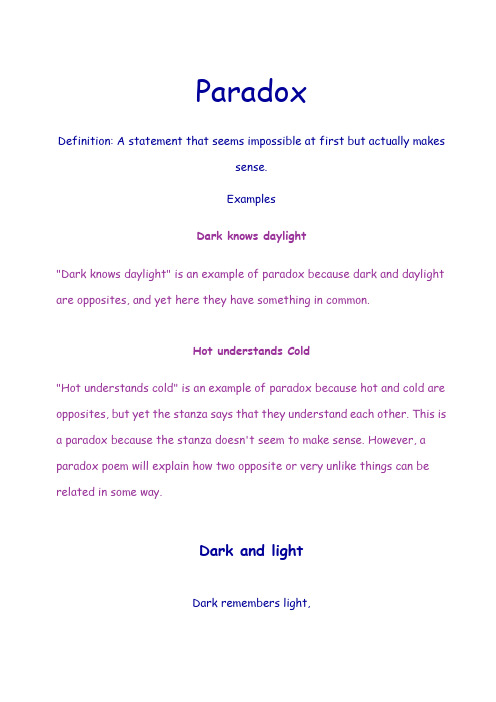
ParadoxDefinition: A statement that seems impossible at first but actually makessense.ExamplesDark knows daylight"Dark knows daylight" is an example of paradox because dark and daylight are opposites, and yet here they have something in common.Hot understands Cold"Hot understands cold" is an example of paradox because hot and cold are opposites, but yet the stanza says that they understand each other. This is a paradox because the stanza doesn't seem to make sense. However, a paradox poem will explain how two opposite or very unlike things can be related in some way.Dark and lightDark remembers light,The day they separated,They try to be friends, butcan't.Dark doesn't like lightTheir friendship no longer exists.By AlexNIGHT REMEMBERS LIGHTNight remembers the light of anewbornstar.Night remembers how he heldthe littlestar,And now you can seethe star,Much bigger nowfor now it isthe sun.By RachelFor example: "I know that I know nothing." Knowing "know nothing" is knowing something thus cannot be "know nothing". This logic is self-contradictory, but one can know that they know nothing.IronyTo say something that is the opposite of the truth. In a scary movie when the audience knows that a killer is in the house, but the owners in the house don't know it.At a restaurant there is a fly floating in a customer's soup and the customer says, "Mmmmm. Insect soup, my favorite!"When watching a talk show, the audience knows why a person has been brought on the show. However, the person sitting in the chair does not know that he is going to be reunited with a former lover.You break a date with your girlfriend so you can go to the ball game with the guys. When you go out to the concession stand, you run into your date who is there with another guy.You stay up all night studying for a test. When you go to class, you discover the test is not until the next day.You are arguing with your mother, who reprimands you for being "smart." Your reply is sarcastic, "If you think I am smart, then why won't you let me make some smart decisions?"Your boyfriend shows up in ripped jeans and a stained t-shirt. With a smirk, you say, "Oh!I see you dressed up for our date. We must be going to a nice restaurant!"The average cost of rehabilitating a seal after the Exxon Valdez oil spill in Alaska was $80,000. At a special ceremony, two of the most expensively saved animals were released back into the wild amid cheers and applause from onlookers. A minute later, they were both eaten by a killer whale.A boy and his friends are talking trash about the principal, and the principal is standing right around the corner listening.Terrorist Khay Rahnajet didn't pay enough postage on a letter bomb. It came back with "return with sender" stamped on it. Forgetting it was the bomb, he opened it and was blown to bits.Two animal rights activists were protecting the cruelty of sending pigs to a slaughterhouse in Bonn. Suddenly the pigs, all two thousand of them, escaped through a broken fence and stampeded, trampling the two hapless protestors to death.Irony: a leading part of humor. Irony is using words to express somethingcompletely different from the literal meaning. Usually, someone says the opposite of what they mean and the listener believes the opposite of what they said.Verbal irony, including sarcasmVerbal irony is distinguished from situational irony and dramatic irony in that it is produced intentionally by speakers. For instance, if a speaker exclaims, “I‟m not upset!” but reveals an upset emotional state through her voice while truly trying to claim she's not upset, it would not be verbal irony by virtue of its verbal manifestation (it would, however, be situational irony). But if the same speaker said the same words and intended to communicate that she was upset by claiming she was not, the utterance would be verbal irony. This distinction gets at an important aspect of verbal irony: speakers communicate implied propositions that are intentionally contradictory to the propositions contained in the words themselves. There are examples of verbal irony that do not rely on saying the opposite of what one means, and there are cases where all the traditional criteria of irony exist and the utterance is not ironic.Ironic similes are a form of verbal irony where a speaker does intend to communicate the opposite of what they mean. For instance, the following explicit similes have the form of a statement that means P but which conveys the meaning not P:as hard as puttyas funny as canceras clear as mudas pleasant as root canal treatmentas sharp as a marbleas straight as a circleThe irony is recognizable in each case only by using stereotypical knowledge of the source concepts (e.g., mud, root-canals) to detect an incongruity.A fair amount of confusion has surrounded the issue regarding the relationship between verbal irony and sarcasm, and psychology researchers have addressed the issue directly (e.g,Lee & Katz, 1998). For example, ridicule is an important aspect of sarcasm, but not verbal irony in general. By this account, sarcasm is a particular kind of personal criticism leveled against a person or group of persons that incorporates verbal irony. For example, a person reports to her friend that rather than going to a medical doctor to treat her ovarian cancer, she has decided to see a spiritual healer instead. In response her friend says sarcastically, "Great idea! I hear they do fine work!" The friend could have also replied with any number of ironic expressions that should not be labeled as sarcasm exactly, but still have many shared elements with sarcasm.Most instances of verbal irony employ sarcasm, suggesting that the term sarcasm is more widely used than its technical definition suggests it should be (Bryant & Fox Tree, 2002; Gibbs, 2000). Some psycholinguistic theorists suggest that sarcasm ("Great idea!", "I hear they do fine work."), hyperbole ("That's the best idea I have heard in years!"), understatement ("Sure, what the hell, it's only cancer..."), rhetorical questions ("What, does your spirit have cancer?"), double entendre ("I'll bet if you do that, you'll be communing with spirits in no time...") and jocularity ("Get them to fix your bad back while you're at it.") should all be considered forms of verbal irony (Gibbs, 2000). The differences between these tropes can be quite subtle, and relate to typical emotional reactions of listeners, and the rhetorical goals of the speakers. Regardless of the various ways theorists categorize figurative language types, people in conversation are attempting to decode speaker intentions and discourse goals, and are not generally identifying, by name, the kinds of tropes used.[edit] Dramatic ironyIn drama, the device of giving the spectator an item of information that at least one of the characters in the narrative is unaware of (at least consciously), thus of placing the spectator a step ahead of at least one of the characters. Dramatic irony has three stages - installation, exploitation and resolution (sometimes called preparation, suspension and resolution) - producing dramatic conflict is produced in what one character relies or appears to rely upon a fact, the contrary of which is known by observers (especially the audience; sometimes to other characters within the drama) to be true.For example:In City Lights, we know that Charlie Chaplin's character is not a millionaire, but the blind flower girl (Virginia Cherill) does not.In Cyrano de Bergerac, we know that Cyrano loves Roxane and that he is the real author of the letters that Christian is writing to the young woman; Roxane is unaware of this.In North by Northwest, we know that Roger Thornhill (Cary Grant) is not Kaplan; Vandamm (James Mason) and his acolytes do not. We also know that Kaplan is a fictitious agent invented by the CIA; Roger and Vandamm do not.In Oedipus the King, we know that Oedipus himself is the murderer that he is seeking; Oedipus, Creon and Jocasta do not.In Othello, we know that Desdemona has been faithful to Othello, but he doesn't. We also know that Iago is pulling the strings, a fact hidden from Othello, Desdemona, Cassio and Roderigo.In Pygmalion, we know that Eliza is a woman of the street; Higgins's family does not.[edit] Tragic ironyTragic irony is a special category of dramatic irony. In tragic irony, the words and actions of the characters belie the real situation, which the spectators fully realize.Ancient Greek drama was especially characterized by tragic irony because the audiences were so familiar the legends that most of the plays dramatized. Sophocles' Oedipus the King provides a classic example of tragic irony at its fullest.Irony threatens authoritative models of discourse by "removing the semantic security of …one signifier: one signified‟";[2] irony has some of its foundation in the onlooker‟s perception of paradox which arises from insoluble problems.For example:In the William Shakespeare play Romeo and Juliet, when Romeo finds Juliet in a drugged death-like sleep, he assumes her to be dead and kills himself. Upon awakening to find her dead lover beside her, Juliet kills herself with his knife.[edit] Situational ironyThis is a relatively modern use of the term, and describes a discrepancy between the expected result and actual results when enlivened by 'perverse appropriateness'.For example:When John Hinckley attempted to assassinate President Ronald Reagan, all of his shots initially missed the President; however a bullet ricocheted off the bullet-proof windows of the Presidential limousine and struck Reagan in the chest. Thus, the windows made to protect the President from gunfire were partially responsible for his being shot.[3]Monty Python's last comedy album The Hastily Cobbled Together for a Fast Buck Album was continuously delayed from release for various reasons, having yet to see an official release, and has since been made available online for free by the group, thus making the album neither hasty nor earning the group any income.The Wonderful Wizard of Oz is a story whose plot revolves around irony. Dorothy travels to a wizard and fulfills his challenging demands to go home, before discovering she had the ability to go back home all the time. The Scarecrow longs for intelligence, only to discover he is already a genius, and the Tin Woodsman longs to be capable of love, only to discover he already has a heart. The Lion, who at first appears to be a whimpering coward turns out to be bold and fearless, The people in Emerald City believe the Wizard to have been a powerful deity, only to discover he was a bumbling eccentric old man.In "The Three Apples", a medieval Arabian Nights tale, the protagonist Ja'far ibn Yahya is ordered by Harun al-Rashid to find the culprit behind a murder mystery within three days or else be executed. It is only after the deadline has past, and as he prepares to be executed, that he discovers that the culprit was his own slave all along.[4][5]After astronaut Gus Grissom's first flight into space, the hatch on his spacecraft accidentally blew off while Grissom was waiting for a rescue helicopter to fish the capsule out of the ocean, causing the capsule to fill with water and sink and Grissom to nearly drown. The hatch system was re-designed in later spacecraft to prevent similar accidents, and, while training for his third spaceflight, a fire broke out inside Grissom's spacecraft, causing Grissom and two other astronauts to suffocate. The hatch redesign triggered by the accident with Grissom's first spacecraft, meant to help save astronaut's lives, prevented Grissom from being rescued in the subsequent accident.[edit] Irony of fate (cosmic irony)The expression “irony of fate” stems from the notion that the gods (or the Fates) are amusing themselves by toying with the minds of mortals, with deliberate ironic intent. Closely connected with situational irony, it arises from sharp contrasts between reality and human ideals, or between human intentions and actual results.For exampleIn art:In O. Henry's story The Gift of the Magi, a young couple are too poor to buy each other Christmas gifts. The man finally pawns his heirloom pocket watch to buy his wife a set of combs for her long, beautiful, prized hair. She, meanwhile, cuts off her treasured hair to sell it to a wig-maker for money to buy her husband a watch-chain.In the ancient Indian story of Krishna, King Kamsa is told in a prophecy that a child of his sister Devaki would kill him. In order to prevent it, he imprisons both Devaki and her husband Vasudeva, allowing them to live only if they hand over their children as soon as they are born. He murders nearly all of them one by one, but the eighth child, Krishna, is saved and raised by a cowherd couple, Nanda and Yasoda. After growing up and returning to his kingdom, Kamsa is eventually killed by Krishna, as was originally predicted by the self-fulfilling prophecy. It was Kamsa's attempt to prevent the prophecy that led to it becoming a reality.Rakesh Roshan's 2006 Indian film Krrish is a modern take on the story of Krishna.In history:In 1974 the Consumer Product Safety Commission had to recall 80,000 of its own lapel buttons promoting "toy safety", because the buttons had sharp edges, used lead paint, and had small clips that could be broken off and subsequently swallowed. [6]Importing Cane Toads to Australia to protect the environment only to create worse environmental problems for Australia.Jim Fixx, who did much to popularize jogging as a form of healthy exercise in his 1977 book The Complete Book of Running, died at the age of 52 of a heart attack (a death associated with sedentary, unhealthy lifestyles) while out jogging.[edit] Historical irony (cosmic irony through time)When history is seen through modern eyes, it sometimes happens that there is an especially sharp contrast between the way historical figures see their world and the probable future of their world, and what actually transpired. For example, during the 1920s The New York Times repeatedly heaped scorn on crossword puzzles. In 1924 it lamented "the sinful waste in the utterly futile finding of words the letters of which will fit into a prearranged pattern;" in 1925 said "the question of whether the puzzles are beneficial or harmful is in no urgent need of an answer. The craze evidently is dying out fast;" and in 1929 judged that "The cross-word puzzle, it seems, has gone the way of all fads." Today, no U.S. newspaper is more closely identified with the crossword than The New York Times.[citation needed] In a more tragic example of historical irony, what people now refer to as "World War I" was originally called "The War to End All Wars" or "The Great War". Historical irony is therefore a subset of cosmic irony, but one in which the element of time is bound up.Other examples:"They couldn't hit an elephant at this distance." Nearly the last words of American Civil War General John Sedgwick before being shot through the eye by a Confederate sniper.[7] In Dallas, in response to Mrs. Connolly's comment, "Mr. President, you can't say that Dallas doesn't love you," John F. Kennedy said, "That's very obvious." He was assassinated immediately afterwards.[8]Further examples of irony in history:Alfred Nobel invented the relatively stable explosive dynamite essentially to prevent deaths (such as in mining work which relied on the unstable explosives gunpowder and nitroglycerin), but his invention was soon taken up as a weapon in the Franco-Prussian War, among others, causing many deaths.Fritz Haber was the patriotic German Jewish creator of Zyklon B. Initially used as a pesticide, it was later used in the Holocaust.In the Kalgoorlie (Australia) gold rush of the 1890s, large amounts of the little-known mineral calaverite (gold telluride) were identified as fool's gold, and were (foolishly, as it later turned out) discarded. The mineral deposits were used as a building material, and for the filling of potholes and ruts. (Several years later, the nature of the mineral was identified, leading to a minor gold rush to excavate the streets).Ibn al-Haytham of Basra invented the modern camera obscura, as described in his Book of Optics in 1021. Nearly a thousand years later, his hometown of Basra was attacked using camera-guided missiles during the 2003 invasion of Iraq.[9]Several inventors were killed by their own creations, including Haman, Ismail ibn Hammad al-Javhari,[10] William Nelson,[11] Alexander Bogdanov, William Bullock, Marie Curie, Otto Lilienthal, and others.Oxymorons!An oxymoron is a phrase consisting of two contradicting words, that make sense when put together.Here are a few of our favorite oxymorons. Do you think you've got a better one?Airline FoodAlone TogetherCivil WarFriendly ArgumentJumbo ShrimpMedium LargeMinor DisasterOld NewsPretty UglyStudent Teacher。
英语19种修辞手法的全部解释和例句
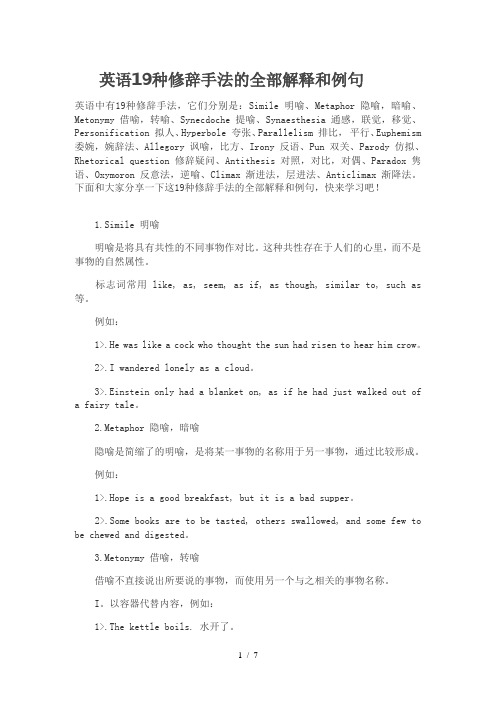
英语19种修辞手法的全部解释和例句英语中有19种修辞手法,它们分别是:Simile明喻、Metaphor 隐喻,暗喻、Metonymy 借喻,转喻、Synecdoche 提喻、Synaesthesia 通感,联觉,移觉、Personification 拟人、Hyperbole 夸张、Parallelism 排比,平行、Euphemism 委婉,婉辞法、Allegory 讽喻,比方、Irony 反语、Pun 双关、Parody 仿拟、Rhetorical question 修辞疑问、Antithesis 对照,对比,对偶、Paradox 隽语、Oxymoron 反意法,逆喻、Climax 渐进法,层进法、Anticlimax 渐降法。
下面和大家分享一下这19种修辞手法的全部解释和例句,快来学习吧!1.Simile 明喻明喻是将具有共性的不同事物作对比。
这种共性存在于人们的心里,而不是事物的自然属性。
标志词常用 like, as, seem, as if, as though, similar to, such as 等。
例如:1>.He was like a cock who thought the sun had risen to hear him crow。
2>.I wandered lonely as a cloud。
3>.Einstein only had a blanket on, as if he had just walked out ofa fairy tale。
2.Metaphor 隐喻,暗喻隐喻是简缩了的明喻,是将某一事物的名称用于另一事物,通过比较形成。
例如:1>.Hope is a good breakfast, but it is a bad supper。
2>.Some books are to be tasted, others swallowed, and some few to be chewed and digested。
Paradox,oxymoron and subject complement
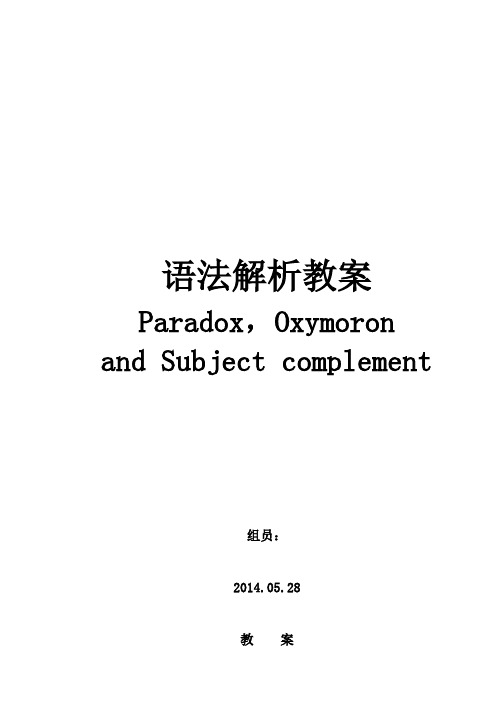
9. There are people who can best be described ascreative plagiarists.
Part Conclusion
Shine darkly暗淡地发光
Slowly hasten慢慢地加快
Heartily deplore由衷地痛惜
(5)n. + n.:
(反映同一事物或行为互为对立,护卫敌对的情感或状态。这种情况下两个名词之间的主次关系不是十分明显,往往用来形容二者之间的难以取舍,或进退两难的境地,或者是复杂难辨的感情。两个单词中间往往用“-”相连。)
Life-death moment生死关头
Love-hate relationship爱恨交织的关系
(6)分词+n.:
(反映互相矛盾、对立、复杂的情感或形式)
Deafening silence震耳欲聋的沉默
Organized chaos有组织的混乱
Long-lived death永生的死亡
(7)n. + of-phrase:
2. Many poor people lived on junk food and werefat from hunger.
6. The more I know, the more confused I become.
(其中,6,7,8都为the more….the more…结构)
Part Oxymoron(矛盾修饰法):
能力要求:
教学重点
Paradox,oxymoron and subject complement
Irony, climax and anticlimax
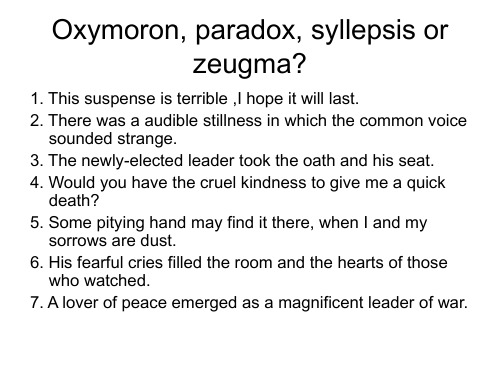
按时间的先后顺序排列
• I came. I saw, I conquered. (Julius Caesar)
– 我来了,我扫视一切,我征服一切。
• Threaten him, imprison him, torture him, kill him: you will not induce him to betray his country.
因语出有典
Allusion
Irony 反语
• A figure of speech in which the intended meaning is the opposite of that expressed by the words used; usually taking the form of sarcasm or ridicule in which laudatory expressions are used to imply condemnation or contempt. --- Oxford English Dictionary
• Irony的最大特点是:用正面的话表达反面 的意思,即反义正说,贬话褒说。 • 反语可以用于讽刺,但并非是讽刺都属反 语,也并非所有的反语都有讽刺意味。 • 在一定的语言环境中,反语比正说、直说 更有力量,更带强烈的感情色彩。
反语的应用
• The virtuous, dignified bishop has four illegitimate children.
– 英迪拉· 甘地总理从一开始就决定采用强硬手段……这场危机绝不 会发展成为印度的水ห้องสมุดไป่ตู้事件。
oxymoron词根词缀
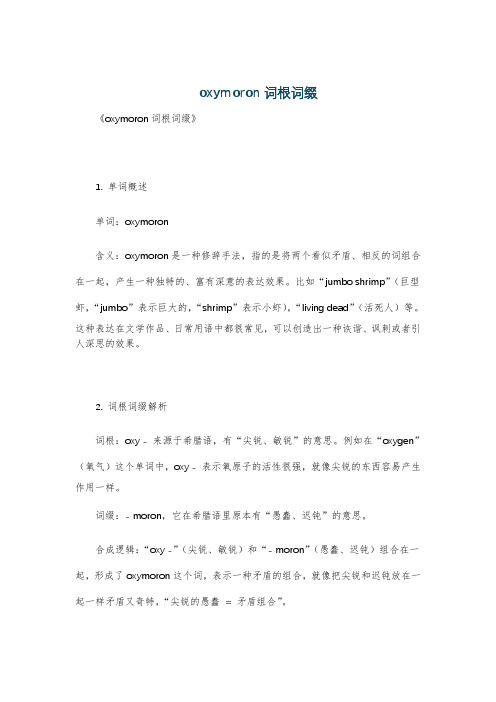
oxymoron词根词缀《oxymoron词根词缀》1. 单词概述单词:oxymoron含义:oxymoron是一种修辞手法,指的是将两个看似矛盾、相反的词组合在一起,产生一种独特的、富有深意的表达效果。
比如“jumbo shrimp”(巨型虾,“jumbo”表示巨大的,“shrimp”表示小虾),“living dead”(活死人)等。
这种表达在文学作品、日常用语中都很常见,可以创造出一种诙谐、讽刺或者引人深思的效果。
2. 词根词缀解析词根:oxy - 来源于希腊语,有“尖锐、敏锐”的意思。
例如在“oxygen”(氧气)这个单词中,oxy - 表示氧原子的活性很强,就像尖锐的东西容易产生作用一样。
词缀:- moron,它在希腊语里原本有“愚蠢、迟钝”的意思。
合成逻辑:“oxy -”(尖锐、敏锐)和“- moron”(愚蠢、迟钝)组合在一起,形成了oxymoron这个词,表示一种矛盾的组合,就像把尖锐和迟钝放在一起一样矛盾又奇特,“尖锐的愚蠢= 矛盾组合”。
3. 应用短文与场景应用短文1:English:I was reading a book the other day, and I came across this really interesting oxymoron - "bittersweet". It got me thinking about how life is full of these oxymoronic situations. I was chatting with my friend Tom about it. "Tom," I said, "isn't it crazy how we have words like 'bittersweet'? It's like saying something is both good and bad at the same time." Tom laughed and replied, "Yeah, it's like that time I got a promotion at work but had to move to a new city away from all my friends. It was a happy - sad moment, just like 'bittersweet'." We started coming up with more examples. "What about 'deafening silence'?" I asked. "Oh, that's a great one!" Tom exclaimed. "It's like when you're in a big empty room, and there's no sound at all, but the lack of noise is almost overwhelming. It's as if the silence is so loud it deafens you." This made me realize how oxymorons can really capture the complexity of our feelings and experiences.Chinese translation:前几天我在看书的时候,碰到了一个非常有趣的矛盾修饰法的词——“苦乐参半”。
关于对比的英文花式表达

关于对比的英文花式表达Literary Devices for Contrasting Ideas: A Comprehensive Guide.In the realm of written expression, the ability to effectively convey contrasting ideas is crucial. Language possesses a myriad of nuanced tools that enable writers to juxtapose opposing concepts, highlight disparities, and underscore points of divergence. This guide delves into an array of literary devices that serve this specific purpose, providing a comprehensive understanding of their usage and impact.1. Antithesis.Antithesis, a staple of rhetorical discourse, places two opposing ideas side by side to accentuate their contrasting nature. Its essence lies in presenting a stark contrast that draws the reader's attention to the fundamental differences between two concepts.Example: "The world is a comedy to those who think, a tragedy to those who feel." (Horace Walpole)。
修辞借喻

Rhetorical Devices
Metonymy and Synecdoche
Metonymy和Synecdoche的含义与形式 1.Metonymy译作“借喻” ,Synecdoche译作“提喻”。这两种辞格十分相近, 其共同点是不直接说出所指对象的名称,而采取某种替代形式;它们的区别 在于:metonymy是借与此相关某事物密切相关的东西来表示该事物,因此亦 称之为“借代”,而synecdoche是以某事物的局部表示整体,或反过来以整体 表示局部。例如人在幼年离不开摇篮。因而借用the cradle表示“婴几时期”, 这就是Metonymy: He must have been spoiled from the cradle. 又如:“头”和“手”等是人体的部分,用它们表示整个人常见的Synecdoche形 式; More hands (=working men) are needed at the moment. 2.注意这两种辞格与其他比喻形式之间的区别、试比较: Greece was the cradle of Western culture. (Metaphor) A bird in the hand is worth two in the bush. (Analogy)
1.They were short of hands. 2.My TV is out of order. 3.He could hardly earn his everyday bread. 4.The soldier is a valiant heart. 5.We had dinner at ten dollars a head. 6. Yet there were some stout heart who attempted resistance.
常用英语修辞手法
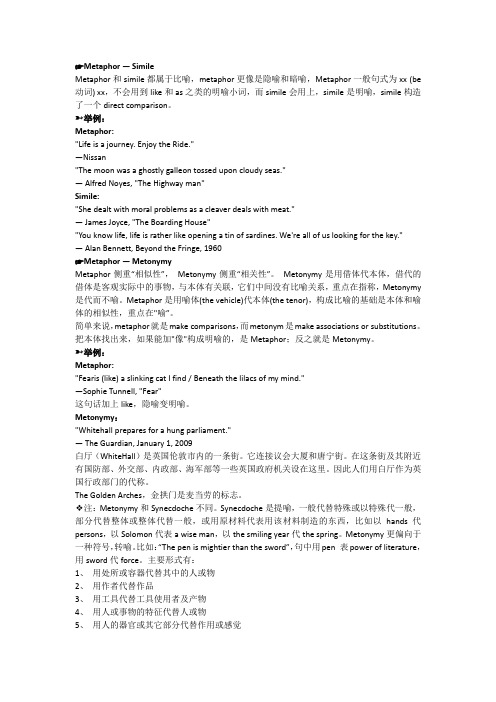
☛Metaphor — SimileMetaphor和simile都属于比喻,metaphor更像是隐喻和暗喻,Metaphor一般句式为xx (be 动词) xx,不会用到like和as之类的明喻小词,而simile会用上,simile是明喻,simile构造了一个direct comparison。
➸举例:Metaphor:"Life is a journey. Enjoy the Ride."—Nissan"The moon was a ghostly galleon tossed upon cloudy seas."— Alfred Noyes, "The Highway man"Simile:"She dealt with moral problems as a cleaver deals with meat."—James Joyce, "The Boarding House""You know life, life is rather like opening a tin of sardines. We're all of us looking for the key."—Alan Bennett,Beyond the Fringe, 1960☛Metaphor — MetonymyMetaphor侧重“相似性”,Metonymy侧重“相关性”。
Metonymy是用借体代本体,借代的借体是客观实际中的事物,与本体有关联,它们中间没有比喻关系,重点在指称,Metonymy 是代而不喻。
Metaphor是用喻体(the vehicle)代本体(the tenor),构成比喻的基础是本体和喻体的相似性,重点在"喻”。
简单来说,metaphor就是make comparisons,而metonym是make associations or substitutions。
- 1、下载文档前请自行甄别文档内容的完整性,平台不提供额外的编辑、内容补充、找答案等附加服务。
- 2、"仅部分预览"的文档,不可在线预览部分如存在完整性等问题,可反馈申请退款(可完整预览的文档不适用该条件!)。
- 3、如文档侵犯您的权益,请联系客服反馈,我们会尽快为您处理(人工客服工作时间:9:00-18:30)。
6、矛盾修饰法(Oxymoron)矛盾修饰法是一种把互相矛盾或不调和的词合在一起的修辞手法,如在“震耳欲聋的沉默”和“悲伤的乐观”。
例:There was in her face,when she returned to her husband,look of radiant melancholy that he was not familiar with.此处的短语radiant melancholy 采用了矛盾修饰法,意为“快乐的忧郁”。
这种修辞格的使用很好地描述了艾琳的心态:她既为这个充满奸诈、虚伪的社会感到忧郁,又为自己刚做的一件善事而感到高兴。
这两种情感形成了鲜明的对比,发人深省。
9、反语(Irony)反语是用词语表达与它们的字面意思相异或相反的用法。
它是一种以对比达到幽默效果的修辞方式。
例:You dirty dog,you!First a surprise party-which I abhor …这个例子中存在两个反语即you dirty dog和abhor。
全意是:你这个坏小子,真有你的!先是出其不意地搞一个宴会——这我可不喜欢……句中第一个反语you dirty boy通常用作侮辱性语言,但此处确相反,是对对方的一种昵称,言语中透露出喜爱的意味;abhor原意是“憎恶”,用在此处医生激动不已的心情及其感谢露与其表,不言而喻。
用反语表达其感情比平铺直叙要强烈的多。
反语可分为词语反语、情景反语和戏剧性反语三大类,它的作用在于讽刺挖苦、幽默俏皮,有时也可表亲昵之情.电影《肖申克的救赎》运用了多种反讽方式,影片中一些语言“言在此而意在彼”,表达的是否定语言能指的含义,构成了最常见的语言反讽。
如典狱长诺顿引用圣经语言教导囚犯:“我是世界之光,跟随我的人不会行于黑暗,还会拥有生命之光。
”而实际上,在他管理之下的肖申克监狱罪恶累累,他加给狱犯的只有更深的黑暗。
在实行狱外计划时,诺顿口口声声自称这是“一个真正的、有进步意义的服刑和改造。
我们的服刑人员,被正确的监管的服刑者,将走出高墙,为各种公共服务进行劳动。
”他的话中反复强调“真正、进步、有意义、确实”等崇高的概念,而其真实的动机只是满足个人的贪婪。
而承包商为了保护自己的生意不被诺顿抢走,采取了贿赂的方式取悦诺顿:“尝一下我太太特意为你烤制的馅饼吧,然后再考虑一下。
”这里,表面上是温情的友谊,而实际上“馅饼”之下掩盖着肮脏的内幕交易。
这样各自冠冕堂皇的能指语言与追求私利的所指之间形成了鲜明对照,语言反讽的刀刃突显出其内在的锋利。
此外,像影片中喜欢鸡奸男犯的三恶徒命名为“三姐妹”,专横跋扈的守卫队长哈雷被捕时,叙述者黑人瑞德形容其“哭的像个小姑娘”,老布鲁克斯上吊自杀前在旅馆屋梁上刻下“布鲁克斯·哈特兰到此一游”等等,都具有非常明显的“言此意彼”的反讽意味。
情境反讽或命运反讽在影片中有诸多表现。
影片开头是庄严的法庭庭辩,一边是主人公安迪对谋杀妻子和其情人罪行的苍白无力辩护,一边是起诉律师滔滔不绝、言之凿凿、气势逼人的有罪推理,表象上看,一系列证据链均指向了安迪,而事实上雄辩的律师和庄严的法庭共同将无辜者的命运推入有罪的深渊。
1.英语中的Paradox 意思是似非而是的论点,似非而是的隽语。
如:More haste, less speed. 欲速则不达。
此类妙语,古今中外皆有,它们看/听似有悖常理,其实却凝聚着人类的智慧!下面我整理了一些例子,看看哪一条与你“心有戚戚焉”。
If we want peace, be prepared for war. 想要和平,先准备好战争。
(比较:练武是为了不动武。
不赌为赢--[某赌王的遗言] )There’s nothing permanent in life but change. 变是唯一的不变。
(比较:世上除了骗子是真的,其它都是假的。
)A creaking gate hangs long. 病夫多长命。
(比较:善游者溺,善骑者堕。
)Still waters run deep. 静水流深。
(深水流静)(比较:大智若愚;大辩稀音。
)The more you give, the more you have. 奉献越多越富有(如爱心)。
(比较:赠人玫瑰,手留余香。
)We’ve learned from history that we‘ve learned nothing from history.我们从历史中学到的教训就是:我们从历史中什么也没有学到。
(比较:程较瘦教课的规律就是没有规律。
)Sometimes you have to be cruel to be kind.有时,为了实现你的善意,你不得不残酷无情。
(比较:打是亲,骂是爱。
)The teachers of English in China teach English so poorly largerly because they teach grammar so well.在中国,老师教英语教得这么差,主要由于他们教语法教得太好了。
A good teacher is one who does all he can to make himself unnecessary.一个好老师应努力使自己成为学生不需要的人。
People have one thing in common: they are all different.所有人都有一个共同点:他们都是不同的。
……于无声处听惊雷;此时无声胜有声;他穷得只剩下钱了;不知道自己的无知,就是最大的无知。
……IRONY 反讽原为文学批评上的一个术语,指由事物的表象与真实之间的矛盾而产生的一种意义。
譬如,《金屋泪》(1958)中,男主角劳伦斯夏威在另结新欢的宴会上,听到了被他遗弃的西蒙仙诺自杀的消息,可是来宾却唱起歌来赞美他是一个快乐的好人。
oxymoron(矛盾修饰法)2007-11-21 13:45share some interesting wordsplain beauty:相貌略显一般的美女wise fool:聪明的傻瓜cruel kindness:残忍的善良honest thief:诚实的盗贼living death:虽死犹生sweet sorrowdangerous calmhostile friendlinesspainful joy反讽的例子,英语修辞格Irony 是用与真正想要表达的意思意义相反的措辞来表达作者的意思, 它被用来或使语言幽默俏皮, 或进行讽刺嘲弄。
例如:1) He reported , “?one could set a t rap anywhere and catch a dozen abler man in a night . ”(Noel Grove) (他报道说, “??你可以在任何地方设一个陷阱, 一夜就可捉到十几个比较有能力的人。
”) abler 原义为“更有能力的”, 这里反其义而用之。
2) This hard - working boy seldom reads more than an hour per week. (这位勤奋的小伙子每周读书很少超过一个小时。
) 这里的hard - working 实指lazy , 深刻地讽刺了他的懒惰。
3) Yes , he is“lazy”. He just works at least 10hours every day. (嗯, 他是“懒”; 他每天不过至少才干十个小时。
) 这里的lazy 是反话正说, 是反驳[3 ] 。
(2) 情景式反语有些正话反说或反话正说不是光靠一两个词所能体现的,而是要靠语境来体现。
所以,情景式反语不属语义修辞范畴,而属超语义修辞范畴。
例如:1) He t ried soldiering for two weeks with a motley band of Confederate guerrillas who diligentlyavoided contact with the enemy. Twain quit after deciding ,“?I knew more about ret reating than theman that invented ret reating. ”(Noel Grove) (马克·吐温当了为期二周的联邦杂牌军, 这些杂牌军千方百计地避免与敌人交战。
他决定离伍时写道: “我学到的退却知识要比发明退却的人知道得还要多。
”) 句子中两处正话反说, 讽刺了南方联邦军贪生怕死、胆小如鼠的特点。
2) Let those Chinese who are short - sighted ,muddle - headed liberals or democratic individualist slisten. Acheson is giving you a lesson ; he is a goodteacher for you. (Mao Tse - Tung) (那些近视的思想糊涂的自由主义或个人主义的中国人听着,艾奇逊在给你们上课了,艾奇逊是你们的好教员。
) 后两句正话反说,揭露了艾奇逊的虚伪与欺骗。
3) Let those Chinese who believe that“victory ispossible even without international help ”. Listen ,Acheson is giving you a lesson. Acheson is a goodteacher , giving lessons f ree of charge , and he istelling the whole t ruth with tireless zeal and greatcandour. (Selected Works of Mao Tse - Tung. IV)(那些认为不要国际援助也可以胜利的中国人听着,艾奇逊在给你们上课了。
艾奇逊是不拿薪水上义务课的好教员, 他是如此诲人不倦地、毫无隐晦地说出了全篇的真理。
) 这几句也是正语反说, 辛辣地讽刺、挖苦了艾奇逊, 揭露了美国当时的侵略阴谋和骗局[3 ] 。
(注:文档可能无法思考全面,请浏览后下载,供参考。
可复制、编制,期待你的好评与关注)。
